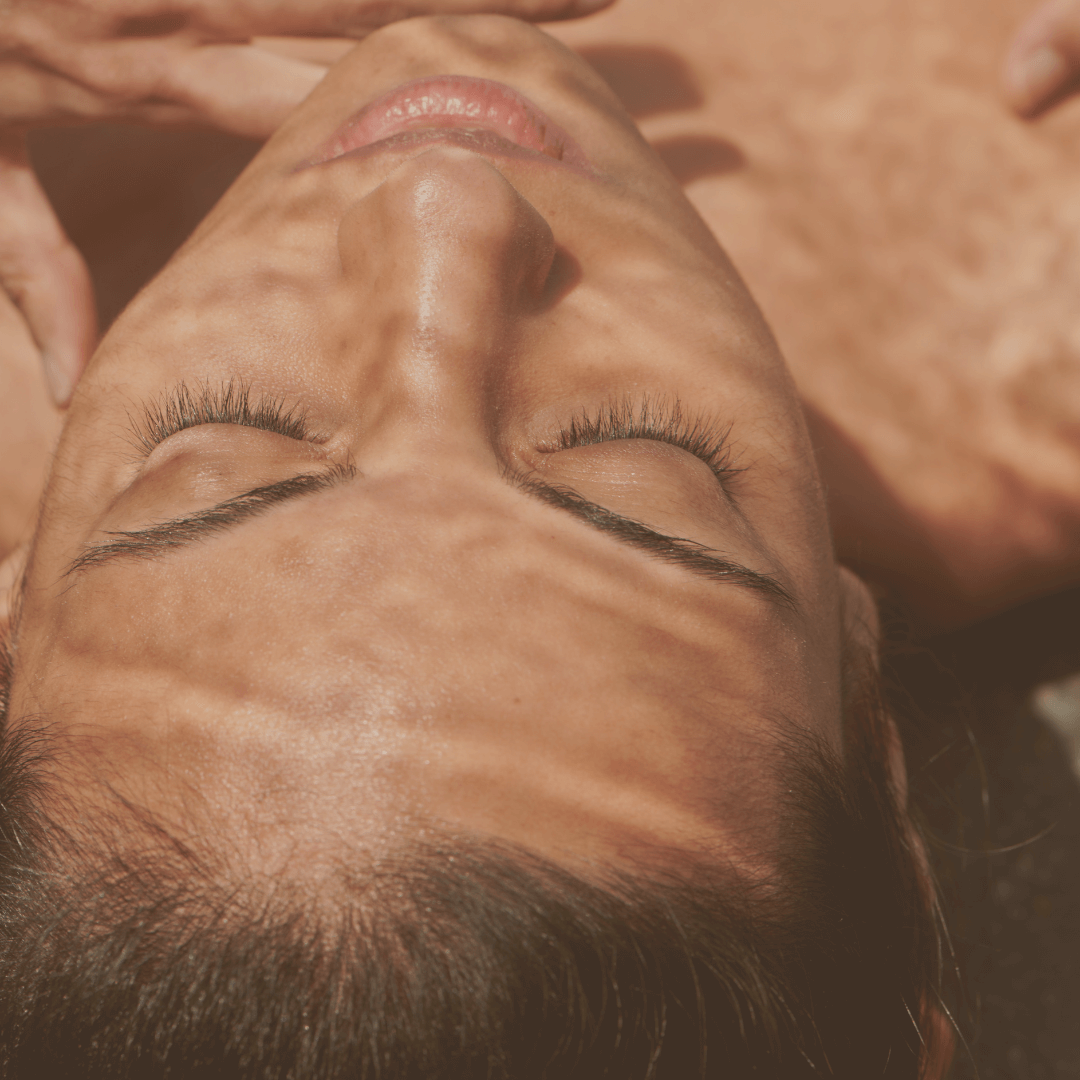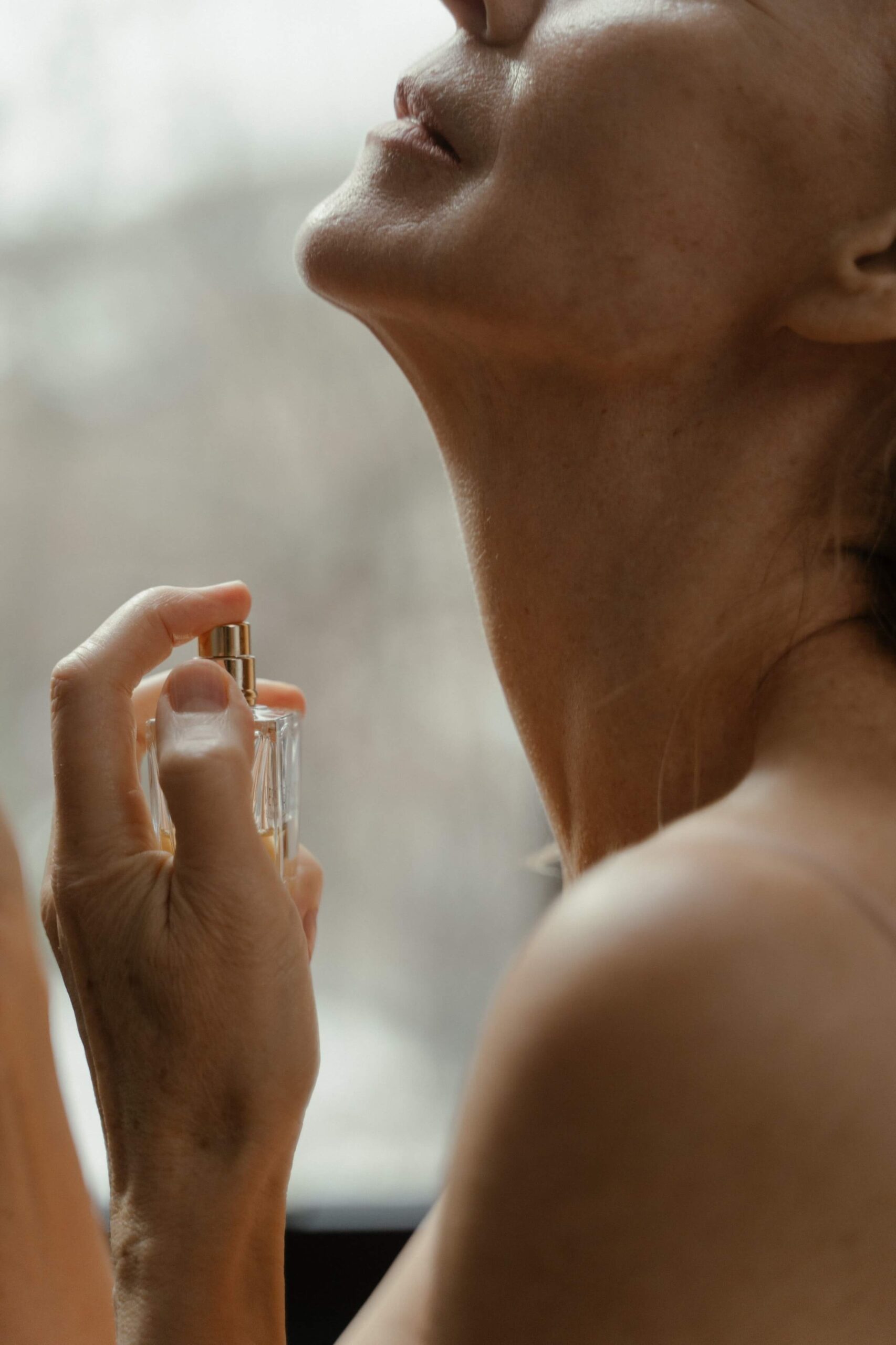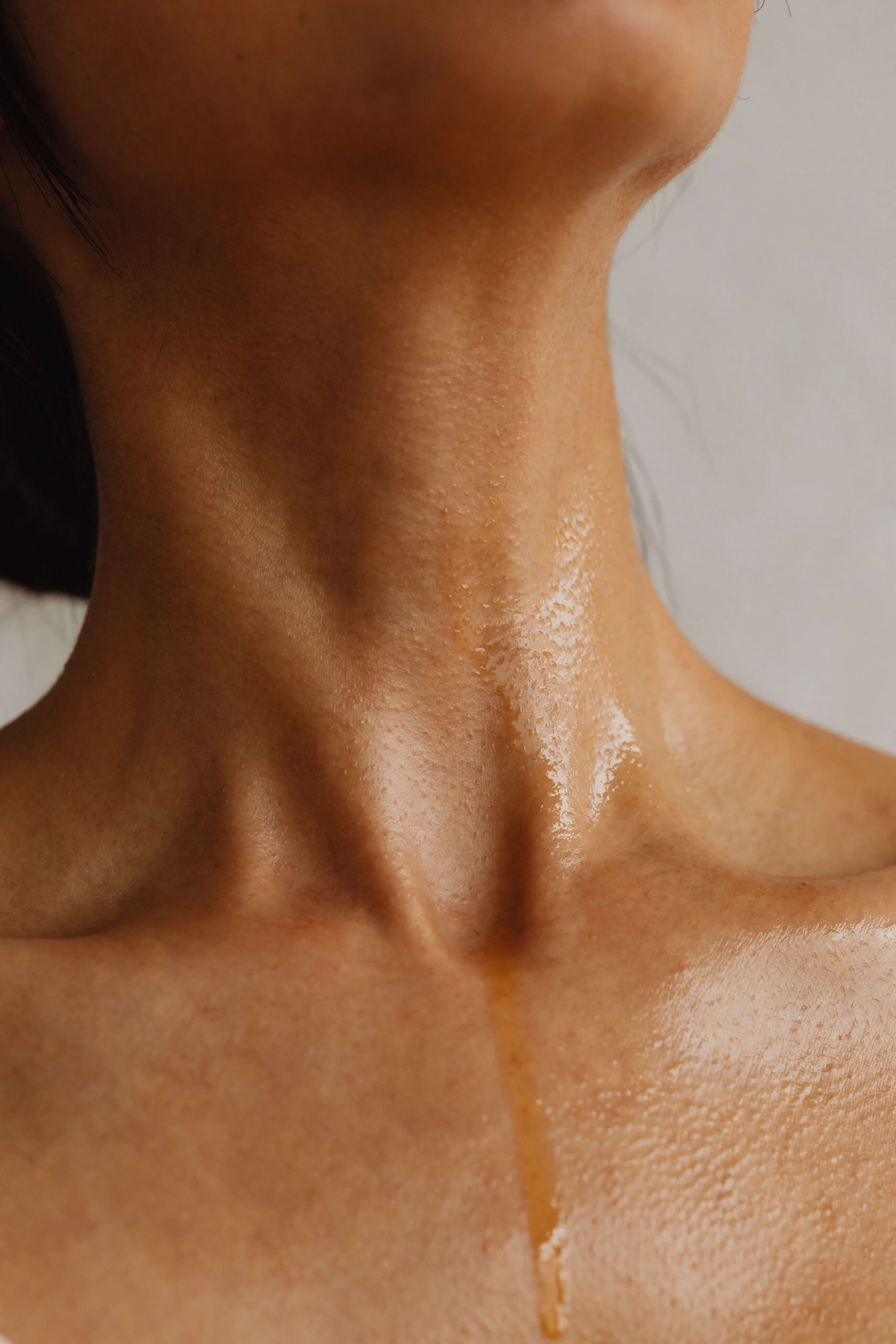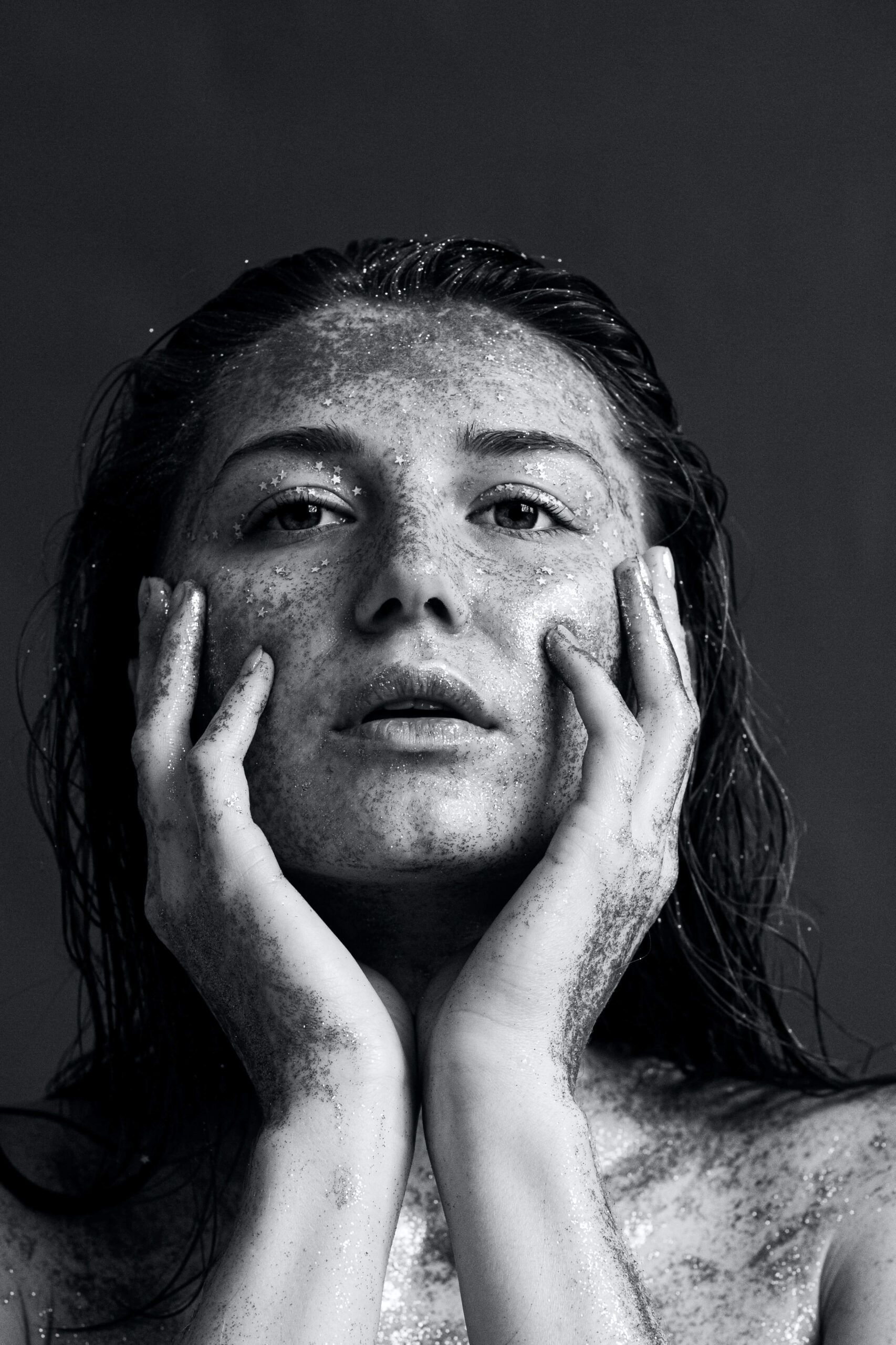Our Endocrine Systems are responsible for hormone production. Hormones are chemical messengers working throughout our body that regulate many bodily functions. They also control major processes such as development, brain function, metabolism, reproduction, and mood. From congestion to aging, hormones also play a major role in our skin health. Some of the most common skin concerns I’ve seen range from mild congestion, dryness, dehydration, and oil imbalances to different grades of acne. Let’s take a look at the most common hormones and how they affect our skin.
Hormone Imbalance Skin Problems
Estrogen
Estrogen is the predominant hormone at the beginning of our cycle. And affects skin thickness, moisture levels, and wrinkle formation. Estrogen assists the skin in remaining supple, youthful, and plump. With a balanced cycle, estrogen and testosterone peak right before ovulation. The peak of testosterone increases oil production. This leaves us with a healthy glow when balanced properly with our estrogen levels. Without the balanced levels of estrogen, the sebum spike from testosterone is what may cause clogged pores instead.
Estrogen is also connected with mature skin concerns, as it decreases during menopause. This can be a precursor to skin dryness and dehydration that may be experienced during menopause.
Progesterone
Known as the pregnancy hormone and the predominate hormone in the second half of your cycle. Progesterone is beneficial for skin elasticity, and circulation and encourages the production of oil during the second half of our cycle. While sebum production increases during this phase, the skin may swell, causing the skin to look supple and pore size to be minimized (not a bad thing!) but this compression may also trap oil underneath the skin surface which can lead to inflammation and breakouts.
Testosterone/Androgens
Male hormones are found in women but in much smaller amounts than men. Male hormones make men, well, and manly, and are what create healthy bone density, muscle growth, balanced fat distribution, healthy mood function, and red blood cell production. All vital needs for women too but in excess can cause conditions such as PCOS, irregular periods, unwanted facial hair and excess oil production in skin, leading to congestion and acne.
Insulin
Insulin is a hormone made by the pancreas that allows your body to use sugar (glucose) from carbohydrates for energy or to store for future use. Foods that break down quickly, such as sugary, refined, and processed foods cause a spike in blood sugar, causing the body to release more insulin than it does with balanced, lower glycemic foods such as vegetables and whole grains.
A diet high in processed foods and consistent blood sugar spikes will cause your cells to become insulin resistant, which leaves insulin floating around in your bloodstream. These high levels of unused insulin have been shown, among many disruptive symptoms, to stimulate oil production and androgen activity. When our blood sugar and insulin levels rise, we experience an increase of inflammation at a cellular level, which will inflame skin.
Cortisol
Known as the stress hormone, cortisol will not damage the skin in low quantities and is responsible for keeping us motivated and thinking quickly on our feet. It is when we experience chronic stress and excess cortisol levels that lead to imbalance including weight gain, anxiety, sleep disorders, fertility issues, and hormonal imbalances. Chronic high cortisol levels stimulate oil glands and sebum production, resulting in skin congestion and flare-ups of acne.
Chronic stress hormones also imbalance blood sugar. High levels of hormones secreted during fight or flight mechanisms can cause insulin to become resistant, therefore leaving it floating around the bloodstream as explained above.
Women therefore experience both the pro-inflammatory cortisol-sugar-insulin connection, as well as the effect of excess androgen male-type hormones from chronic high cortisol levels created from stress. Managing stress and mood is so vital for skin health and more studies continue to emerge around Psychodermatology and the role stress and emotions play in our skin.
PCOS
PCOS, Polycystic Ovary Syndrome, is not a hormone but an imbalance in women, not completely understood, where women’s sex hormones become out of balance and the body starts producing more male androgen’s than normal. This may cause a cease in periods, extra facial hair, oily skin, acne, and difficulty losing weight. PCOS is also related to insulin resistance, which again stimulates oil production, leading to skin congestion and acne often experienced with PCOS. Check out this article to dive deeper into the relationship between stress, hormones, and PCOS.
Balancing Hormones to Keep Skin Nourished
Let’s start with what I refer to as the Three S’s.
It doesn’t matter what your skin type, skin history, your age, what products you use, how much you massage your face, the climate you live in, not even your Ayurvedic dosha, being conscious of the Three S’s are a foundational for your skin to thrive. They are stress, sugar and sleep. These are each vital components to skin homeostasis because they each directly affect our hormones and an imbalance of one will easily become an imbalance to the next.
Keep blood sugar levels balanced by avoiding high sugar and processed foods.
Sugar is sneaky and not only should we look at grams of sugar listed on the label but we also have to decipher which foods raise our blood sugar.
Manage stress correctly and do not let it build up to boiling points.
Utilize outlets such as cardiovascular activity, movement, yoga, meditation, and creative projects, and do not hesitate to say no to things in life that aren’t serving you on a mental health level. We cannot always control external situations or change things overnight but we can take baby steps to do so. It is also helpful to recognize what deserves our attention and energy. Do not let other people’s problems become yours. No need to jump on the bandwagon of other peoples crisis’s, relentless drama and refusal to change their own circumstances. You can be a deeply compassionate and empathetic human with healthy boundaries around your energy and mental health.
Adequate amounts of sleep.
We all know that our skin and complexion are one of the first places to reflect a lack of sleep and when we are tired, we can easily become stressed. When we are stressed, we can easily crave sugar and carbs. Are we seeing the pattern of the Three S’?
Omega Fatty Acids.
Omega 3’s and healthy fats play a role in keeping our cells fluid and assist in regulating hormones that directly affect many functions in the body, including calming inflammation. Skin inflammation not only causes breakouts and acne but also breaks down tissue, collagen, and elasticity in the skin, leading to aging skin concerns as well. Consume foods high in Omega-3s, which include fish, healthy oils, nuts, flax seeds, flaxseed oil, and leafy vegetables. And you could opt to add a cold-pressed, high-quality Omega-3 supplement into your diet.
Birth control.
Plays a huge role in hormone functions and balance. If you are starting (don’t recommend) switching or coming off of birth control, deeply monitor your body’s changes during these times to understand how the pill/patch may have been directly or indirectly affecting your skin. Know that it takes time and often multiple cycles for hormones to balance with any type of birth control use. On, off, or switching.
Cut back on dairy or avoid it completely.
There are synthetic hormones found in much of the dairy industry today and dairy products. Organic or not, they’re made from the milk of pregnant cows. That contain their own female hormones that can disrupt our endocrine systems.
Clean skincare products.
Ingredients found in conventional beauty products are not just stripping our natural oil balance that supports our complexion. They’ll also further cause the skin to produce excess oil in order to protect itself. These products often contain a host of chemicals that will further irritate inflamed skin and disrupt our endocrine systems as a whole.
Take extra care of skin during your cycle.
Hormone fluctuation can cause everything from our mood, breasts, and skin to become extra sensitive during this time.
Have your hormones tested.
An Acupuncturist or Functional Medicine Practitioner would be my recommendation if you are seeking to balance your hormones and health through holistic practices.
Which Hormone Is Called The Beauty Hormone?
Have you ever heard of the “beauty hormone”? Well, it’s real and it’s called estrogen! This powerful hormone plays a crucial role in regulating our menstrual cycle. But did you know it also affects many aspects of our physical appearance? Estrogen helps to maintain healthy skin cells, which can improve skin conditions such as dry skin or hormonal acne. It’s even been linked to hair growth and preventing hair loss.
But, unfortunately, our hormone levels can become imbalanced due to factors like stress levels, taking oral contraceptives, or entering menopause. Enter natural hormone therapy, which can help regulate estrogen and alleviate skin problems like hormonal acne and hair loss. Natural HRT can be a helpful tool for those struggling with skin issues and a functional medicine doctor is a great place to start. Remember, it’s all about finding what works for you and listening to your body’s needs!





